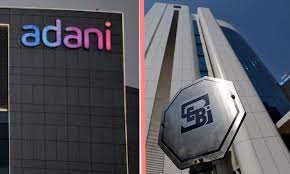SEBI disagrees with the expert panel in the Adani case and promises to take action if any violations are discovered
The capital markets regulator SEBI informed the Supreme Court on Monday that its 2019 rule revisions did not make it harder to identify beneficiaries of offshore money and that enforcement will be pursued in the event of any violations.
According to SEBI, regulations on related-party transactions and beneficial ownership have been progressively strengthened. These two issues are crucial to the claims that Adani Group manipulated the price of its shares.
According to a preliminary assessment issued in May by a Supreme Court-appointed expert committee, there was no regulatory failure and “no evident pattern of manipulation” in the businesses owned by billionaire Gautam Adani.
However, it noted a number of SEBI (Securities and Exchange Board of India) regulations that restricted regulators’ capacity to conduct investigations, and it claimed that its investigation into potential violations involving money flows from offshore organisations had “drawn a blank.”
In its most recent affidavit to the Supreme Court, SEBI stated that it did not concur with the expert committee’s observation of difficulties in identifying holders of economic interest behind an offshore fund without mentioning the status report of its own investigation into allegations against Adani Group.
Additionally, it disagreed with the panel’s conclusion that stocks will re-price if the market believes that a company’s past actions were unwise. It stated that even though the market may re-price the company’s stocks based on previous transactions, “there is no bar on SEBI to examine any securities laws violations because re-pricing of the stock has happened.”
The expert committee’s opinions are not shared by SEBI, and the agency promised to take appropriate action if any violations were discovered or proved.
The Supreme Court established the expert committee on March 2 to look into allegations of failure to disclose transactions with related parties and stock price manipulation after a report by US short-seller Hindenburg Research alleging accounting fraud, stock market manipulation, and improper use of offshore entities by Adani Group sparked a political controversy, sparked a rout in the conglomerate’s stocks, and dethroned Adani as the third richest man in the world.
The committee was expected to operate in tandem with Sebi’s investigation of foreign companies that invested in the Adani Group. The regulator was granted two months to finish the investigation first, and then additional three months until August 14.
According to the affidavit, SEBI’s regulation modifications for 2019 “tightened the disclosure requirement” regarding beneficial owners.
The expert committee’s advice that a definite deadline be “integrated into the legislation” for the regulator to finish its probe was rejected by SEBI in a 43-page document. SEBI said that imposing such deadlines “may damage the quality of investigation,” lead to restrictions, and raise litigation.”
Tuesday is the next scheduled hearing for the ongoing Adani-Hindenburg case before a bench chaired by Chief Justice D Y Chandrachud.
In the affidavit, SEBI expressed its opinions on the suggestions made by the expert committee about matters such as strong settlement policies, effective enforcement policies, court sanctions, appropriate deadlines, market administration and surveillance measures, and the establishment of financial redress agencies, among other things.
The Board is required to make a prima-facie opinion (reasonable reasons) before appointing an investigative body, therefore prescribing timetables for the beginning of the inquiry and procedures may not be acceptable, the statement stated.
“Furthermore, the type, extent, and complexity of cases in the securities market vary greatly, and’reasonable time’ to finish inquiry would rely on the specifics of each case and the information that is available. As a result, setting deadlines for finishing the probe might affect its quality, according to the SEBI.







